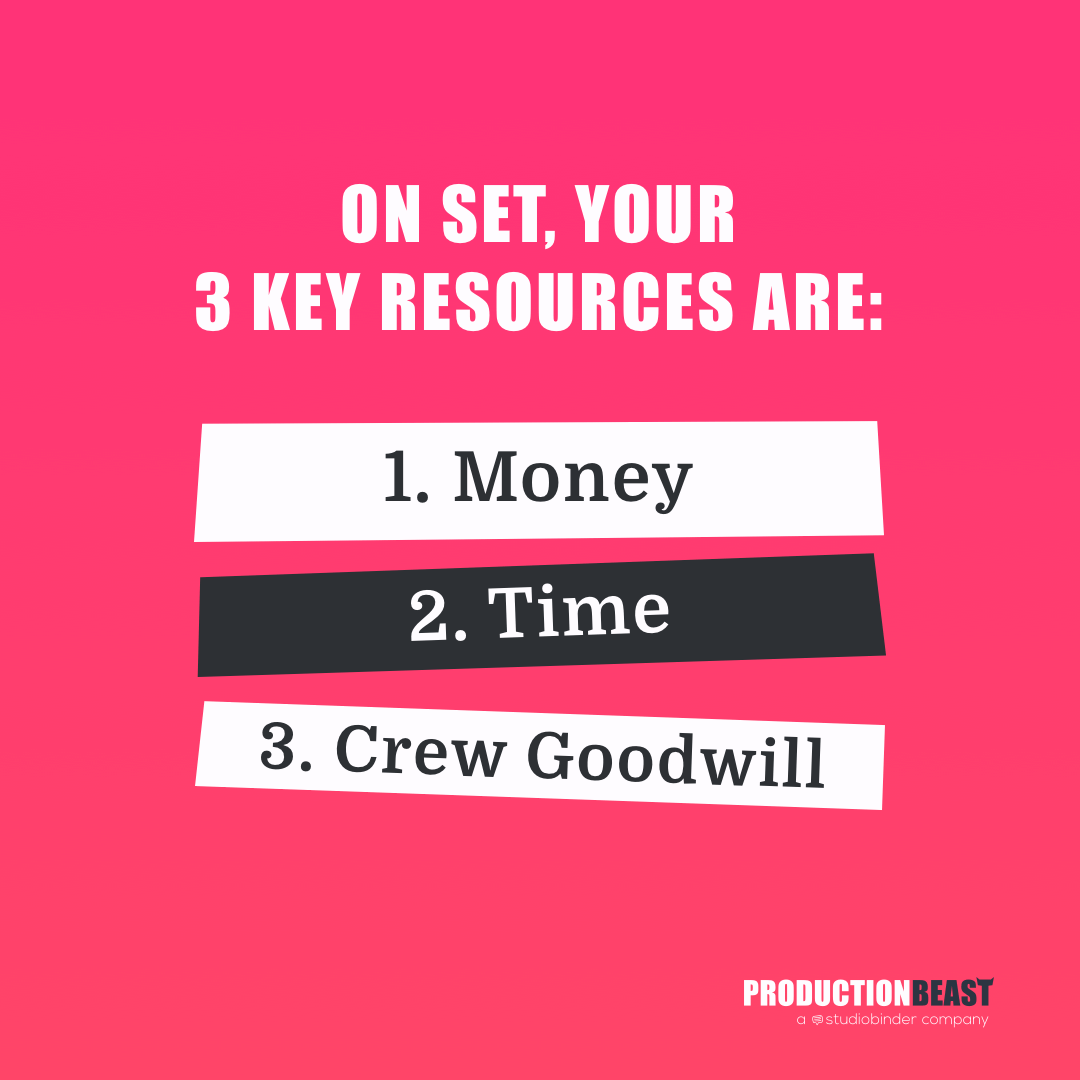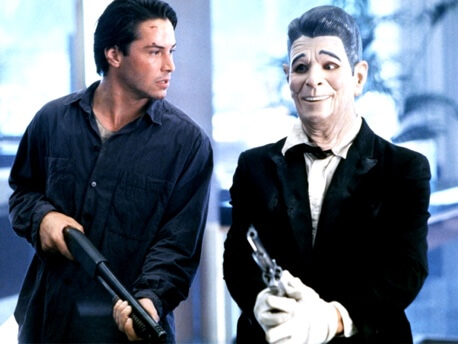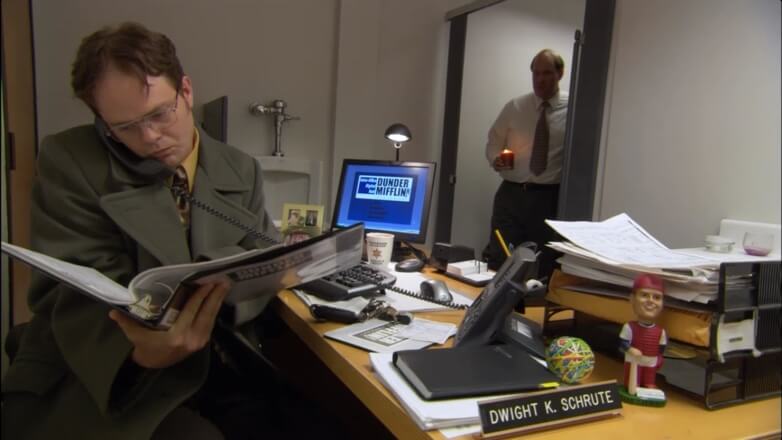As the saying goes: “The second word in show business is business.
It’s not something filmmakers like to think about, but a unit production manager knows that equipment costs money. Those brilliant artists? They expect to get paid. Even if it’s a “passion project,” you have to keep a close budget, because resources aren’t unlimited.
If you like keeping people on track, if you like making sure things get done, then the role of unit production manager might be for you. Here’s how you do it.
What is a Production Manager?
The unit production manager (also known as the UPM or just Production Manager) is the chief administrator of any film shoot. They’re ultimately responsible for the film’s budget, the film’s schedule, and the general managing of the controlled insanity of a film set.
The Unit Production Manager’s Job Description
Once the budget is made and the production schedule laid out, and the plan is set, it is the UPM’s job to actually execute that plan.
Depending on the size of the shoot, the unit production manager might have been directly involved with drawing up that budget and schedule.

Once production actually begins, though, the unit production manager will spend most of their time on the phone -- shifting around resources, reworking the schedule, and convincing the department heads to play nice.
While the unit production manager’s job description doesn’t actually have any creative oversight, they sometimes find themselves pulling rabbits out of hats to support the creative vision.
This means that even if the unit production manager isn’t a creative position, they have to understand the director’s vision and the story’s intent so they can offer creative alternative solutions.
Or know where priorities lie.
You might be thinking that this sounds an awful like a line producer. There’s a reason you’re thinking that.
Unit Production Manager vs. Line Producer
The distinction between the unit production manager and the line producer is… fuzzy. On some shoots, the line producer and the unit production manager will be the same person.
On other shoots, the unit production manager reports to the line producer.
Some will say that a line producer is merely a non-union unit production manager, and there is some truth to that. Unit production managers are covered by the Director’s Guild of America (DGA), with specifically stated duties.
Line producers are largely included under the auspices of the Producer’s Guild of America (PGA) -- which isn’t actually a union, although they do offer healthcare.
It’s also been said that a line producer protects the film while the unit production manager protects the budget.
Both of these job descriptions are overly simplistic, though, as many shoots will have both, and the UPM’s job description is to get a film made, not to protect a budget for the sake of it.
Instead, we suggest you think of it more like this: the line producer has the slightly larger view of the elements of the budget and schedule. They’re thinking week to week, or even month to month.
The unit production manager is on the ground and just making sure everything gets through until Friday with minimal explosions.
Production Coordinators and Accountants
Smaller shoots might only have enough money to pay the unit production manager’s salary and little else.
Large budget films and especially television have enormous logistic challenges that no one person could possibly handle alone. This is where the production staff comes in.
One of the first hires a unit production manager makes is a production accountant (or several if you’ve got something on the level of Game of Thrones).

Look, someone has to deal with the Iron Bank in Game of Thrones (2011)
A production accountant, unsurprisingly, acts as an accountant for the shoot, keeping track of expenses, making sure money is coming out of escrow at regular intervals, etc. They’ll be the ones who alert the unit production manager if money troubles are on their way.
The other major position worth mentioning is the production coordinator. Production coordinators act as the unit production managers hands, eyes, and ears, all over the production.
They can act as HR departments, office managers, or even accountants. While it’s fairly clear what a production manager is, the production coordinator’s portfolio is vaguer.
In fact, the production coordinator’s job description is so wide and varied that they one of the few set positions with no union-mandated minimum.
Their union, IATSE Local 871, has lobbied heavily to get minimums for production coordinator salaries, but the lack of an official production coordinator job description has made them unsuccessful thus far.How to Be a Great Unit Production Manager
The worst unit production managers are hard-nosed, uncompromising autocrats. The very embodiment of “suits” who ruin great works of art to make money.
But that unfair stereotype is only true of bad unit production managers. Great unit production managers are there to make the film as great as possible, and there are a few ways to do that.
Go to Film School
A unit production manager must have a rock solid understanding of filmmaking. There are simply too many unique moving parts in a film production that someone without experience could hope to keep up.
No matter how much experience they have in production management otherwise.
More importantly, a unit production manager isn’t simply serving the numerical needs of a budget, they’re trying to get a film made. It’s easy to simply say “No, you can’t do it.”
It’s much harder, and more impressive, to say “We can’t do that, but I think I understand what you wanted and found this solution.”
No degree is required to be a unit production manager (or a production coordinator, for that matter), but most people with degrees have backgrounds in film, media studies, or theater.
No one works in this industry that doesn’t love film and tv, after all.
Learn to Budget
In many ways, production management is a game of resource management.

That third one is somewhat nebulous. Essentially, it means keeping everyone happy. This isn’t just the matter of dealing with Hollywood egos, sets can be bruising places to work for.
Unhappy cast and crew make mistake. Mistakes cost you time and money.
Learning how to budget and schedule (which is a form of budgeting time) is critical. You can take courses on these subjects, as well as take in some online tutorials to learn the basics.
But if you really want to make it to the next level, there are two important lessons.
The first is understanding how your three resources affect each other. As the old saying goes: You can do it fast, you can do it well, or you can do it on budget. You can do one of those or even two of those, but you can’t do all three.
The second is that while those budget lines are just numbers to you, they’re everything to other members of the crew. When you talk to them, it’s important to understand how much emotion they may have invested in it.
Run a Tight Ship
Remember: a production manager’s salary is earned by keeping the film rolling by any means necessary.

Well, maybe not any means. Point Break (1991) doesn’t end well for the bank robbers.
Production management is ultimately about, well, management. That means people skills alongside business skills. The ability to cajole, encourage, and say no in turns is the mark of a great film UPM.
Sometimes you need a light touch. If what the costume designer is asking for really will make the movie, open up the contingency fund.
Other times, you need to be a hardass. Especially if you know the cinematographer won’t actually use those lenses. He just really wants to try them and is seeing what he can get from you.
While more books have been written about management than we can count, we do have one tip that we think is especially important for film and television management.
People who work in film and tv do so because they are deeply passionate and emotionally invested in it. Hollywood egos are often the result of caring deeply about the craft.
Respect that and try not to offend it. Don’t pick fights publically and always deliver bad news in person, instead of having one of your production coordinators serve as a hatchet man.
Both are small gestures that show you respect your crew and how important this artistic endeavor is to them.
Get a Unit Production Manager Job
UPM’s are, by definition, management. It’s why unit production manager’s salaries are on the higher end of the below-the-line scale.
After all, they control the purse strings and are on the very small list of people who can tell the director “no”.
Unless you’re on a very small set, you aren’t likely to make that jump immediately. Here’s how you get there.
Work on Set
While we often counsel people to get a job on set, no matter what they eventually want to do, a unit production manager absolutely must work on a set. On as many sets as possible.
The most important trick of the production manager’s job description is to be able to read a script and know in their bones roughly how much it will cost.
All the accounting classes in the world won’t teach you this. It can only be learned by putting in your thousand hours.
While any position will teach you valuable lessons, it’s most common to start as a production assistant. This will put you in touch with other administrative roles on the set -- the 1st assistant director, the producer, and possibly even a unit production manager.
Even if you’ve got some hours as a PA under your belt, hop onto ProductionBeast and look for shoots that are staffing up. Don’t be afraid to freelance for other departments. The more you learn, the better you’ll be at your eventual job.Work in an Office
Of course, while on set work is all well and good, you’ll eventually want to work your way into the production office, likely as an office PA or a production coordinator.

Maybe not THE Office (2005)
If you’ve been carefully logging all your gigs into ProductionBeast, you should have built a network of contacts who know you’re reliable.
Office jobs go fast, so it’s time to leverage those contacts and hear about them before they even hit the job boards.
Once you’ve landed your job as an office production assistant (or even a production coordinator!) do a great job and keep your ears open. You’re here to learn as much as you are to work.
Get some time with the budget, see where all the money goes and how the budget moves and changes as production goes on.
When you feel ready, take on a smaller project -- a short or an indie film as a UPM or a line producer. Once you’ve seen your first through to completion, producers grow much more comfortable trusting you with their money.
Earn a Production Manager’s Salary
Production managers and production coordinators are generally paid by the production -- with the possible exception of working as a TV production manager. More on that in a moment.
Thus, a production manager must always stay on top of their job search. Even when they’re neck deep in 70-hour work weeks.
DGA members know that their production manager’s salaries are protected by DGA minimums, but only if they’re working as a unit production manager. If they’re working as a line producer, they’re on their own.
As discussed earlier, a production coordinator’s salary is entirely subject to local minimum wage laws and their own negotiating skills. Their
In general, a unit production manager’s salary is roughly $3,500 to $4,800 per week according to Forbes. Scale that up by the number of films you work in a given year, and a unit production manager can earn a comfortable living.Consider Working in Television
Should they decide to work on a television show, a unit production manager’s salary will become much more regular.
In this chaotic, freelance world of film and television, there might be something appealing about this.
The trade-off is the hours -- unit production managers are some of the hardest working people on set for film productions. Add television’s grind into the mix and those hours will only shoot up.
Everything’s a trade-off.
The Final Line Item
To most people in the industry, the idea of staying in an office, staring at schedules and budgets sounds like pure torture. There’s a reason so many films depict office jobs as hell, after all.
But now that you have an idea of what a production manager is, you know that without them, the film doesn’t get made. Without them, the artistic vision will never survive to be put on the silver screen.
Interested in getting things made? Sign up at ProductionBeast and find a set that needs your help today!
LIKE THIS POST? SHARE IT!
"How to Become a Unit Production Manager: The Art of Saying No" #filmmakers #indie




